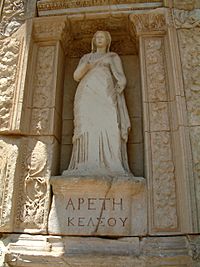Virtue facts for kids
Virtue is a way of behaving that is considered good and right. It's about having strong moral principles and doing things that benefit others and society. When someone lives a "virtuous" life, it means they are doing good things and acting in ways that are seen as positive and helpful. The opposite of virtue is vice, which means bad habits or behaviors.
Throughout history, many Philosophers have thought deeply about what virtue truly means. They have shared their ideas on how people can live good lives.
Contents
Ancient Greek Virtues
The Ancient Greek philosophers, like Plato, believed that there were four main virtues. These were:
- Justice: Being fair and treating everyone equally.
- Courage: Being brave and facing challenges, even when it's scary.
- Wisdom: Having good judgment and making smart choices.
- Moderation: Not doing too much or too little of anything; finding a balance.
Virtues in Different Religions
In the Christian religion, three very important virtues are mentioned in the Bible, specifically in the book of First Epistle to the Corinthians, chapter 13, verse 13. These are:
- Faith: Believing in something, often a higher power or a set of principles.
- Hope: Having a positive outlook and expecting good things to happen.
- Charity: Showing kindness and giving help to others, especially those in need.
These virtues are also very important in other major religions, like Judaism and Islam, where they guide people on how to live a good and moral life.
Related pages
Images for kids
-
Cardinal and Theological Virtues by Raphael, 1511.
-
A statue showing virtue (called Ἀρετή in Greek) in the Library of Celsus in Ephesus, Turkey.
-
Parshvanatha, a spiritual leader who taught about non-violence (ahimsa).
-
A statue of Valluvar at SOAS, University of London.
See also
 In Spanish: Virtud para niños
In Spanish: Virtud para niños
 | Stephanie Wilson |
 | Charles Bolden |
 | Ronald McNair |
 | Frederick D. Gregory |







